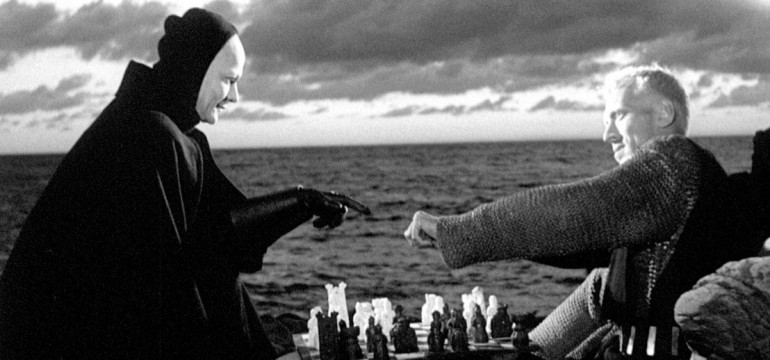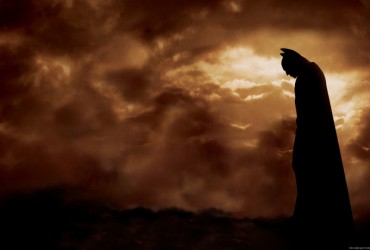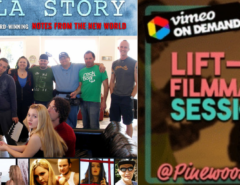While not considered an existentialist himself, Fyodor Dostoevsky is widely regarded as a founder of the movement. His notable existential works and writings inspired a new way of thinking and style of storytelling that changed the literary world and all its influences. Looking through a film lens, it is clear to see how Dostoevsky’s existential philosophy of acting properly by being authentic to oneself has had a great impact on the works of some of the most prominent filmmakers. One-Hundred and Fifty Four years after Dostoevsky’s first groundbreaking novella Notes From The Underground was first released, it is easy and enthralling to examine how Dostoevsky’s ideas have influenced what are known as existential films. Examining prominent existential films through different cinematic movements and decades showcases Dostoevsky’s effect and how the great Russian author’s influence is still alive and well in the modern-day.
The Razor’s Edge
Dostoevsky’s influence has spread throughout the world, even in some of the most traditional of places. There is no greater traditional cinematic landscape than classical Hollywood itself and Dostoevsky’s existential themes managed to have a major impact. Edmund Goulding’s Dostoevsky inspired film The Razor’s Edge(1946) is the strongest example of Dostoevsky’s influence in this time period of American cinema. The Razor’s Edge is based on W. Somerset Maugham’s novel and tells the story of a man traumatized from the horrors of World War One, who searches for the meaning of life. In his journey of discovery, the protagonist leaves a life of wealth, to live a simpler life working in a coal mine in Paris. Eventually, he goes to India to learn from a mystic man and finds enlightenment by finding happiness within himself, as opposed to materialistic luxuriousness around him. The film’s plot and themes are heavily influenced by Dostoevsky’s own personal experience and his famous writing inspired by his own experience, The Idiot. Dostoevsky who came face to face with death in his earlier years via firing squad had his own revelation about living through the authentic self. The Idiot tells a similar story of a man living simply and authentically in a life of bliss while being judged and deemed an idiot by others, even though they themselves do not live as free. This again is comparable to The Razor’s Edge as the main character’s enlightenment of feeling as one with God, allows him to live happy as his authentic self, while those around him suffer as a result of their materialism obsessions.
Bicycle Thieves
Vittorio De Sica’s neorealist drama Bicycle Thieves(1948) added to the legitimacy of the Italian Neorealism movement and has a plot that could be straight out of a Dostoevsky novel. Set in Post-War Italy, the protagonist, Antonio, is a working father whose well-being along with his son’s life revolves around the limited work accessed to him due to his owning a bicycle. Once his bicycle is stolen, Antonio and his son spend the duration of the film wandering the city looking for it and face crucial decisions exemplifying an argument on human nature and how far one will go to survive in the world. Like a Dostoevsky character, Antonio is neither good nor bad. He is filled with complicated qualities and contradictions, he is merely a cog in the film’s grand schemes of ideas. Antonio and his son, much like the characters in a Dostoevsky work, go through many ups and downs. No right or wrong answers are ever given to the pair, the audience is left to examine how they deal with the highs and the lows and how Antonio finds his place in a world that is undeniably unfair. In the climax of the film, Antonio commits an act that though initially seems wrong he views as righteous at the time, similarly to Rodion in Dostoevsky’s Crime and Punishment. Dostoevsky’s influence is shown in this scene as it is less about the criminal act itself but more about the character’s psychology and why he would commit it in the first place.
The Seventh Seal
Ingmar Bergman’s entire filmography can be considered existential films one way or another, but none stick out with more Dostoevsky influence than The Seventh Seal(1957). While Bergman’s masterpiece is more surreal than Dostoevsky went with his novels, with the film’s central character Antonius coming face to face with the personification of Death, Dostoevsky’s existential sentiment is on full display. Coming back from the crusades Antonious deals with his mental state and attempts to understand his place in the world. With Death lurking in the background and having conversions with Antonious, both figures discuss the meaning, or more so meaninglessness, of life and how it is up to one’s self to find purpose. In many ways this parallel to Dostoevsky’s own personal background coming close to death by firing squad before being pardoned. The themes and impact of what it means to come close to death and the outlook one has afterward, are comparable in Dostoevsky’s work and how it is shown in Bergmans.
Stalker
Along with Bergman, Andrei Tarkovsky may be the quintessential existential filmmaker with prominent influences of Dostoevsky. Both living in Russia while making their masterwork, Dostoevsky before the Soviet Union, Tarkovsky during, each creator plays upon their Russian experience and troubled past to bring gravity to their work. Tarkovsky innovating on the technology of the time made many science-fiction classics, but they are all grounded in Dostoevsky like existential realism. Unlike other science-fiction filmmakers. Tarkovsky doesn’t dwell on showing off his settings and props to mindlessly wow audiences but instead embarks audiences to think about life in a similar fashion as Dostoevsky does in his writing. What it means to be living and how one sees themself in the world, is critical in both men’s work and Tarkovsky’s ideas are in a similar fashion to Dostoevsky. In his film Stalker(1979) Tarkovsky creates a dangerous area called the zone with a machine in the middle of it that will make any person’s greatest desire come true. The film centers around three men navigating through the zone, discussing what they want to achieve from reaching the machine and the understanding of life. In a dramatic climax, one of the men attempts to blow up the machine to thus ending the dangerous purpose individuals strive for while another character sees the impossibility in this task. With religious metaphors that are similar to the works of Dostoevsky, his ideas and principles are shown in Tarkovsky’s work and presented philosophy.
Blade Runner
It would be very interesting to hear Dostoevsky’s thoughts on Artificial Intelligence and what he thinks they mean to society. It’s safe to guess that without giving a straight answer, Dostoevsky would instead give insight into our psychology for creating such machines and explore the meaning that intelligent machines might create for themselves. While this conversation is nothing more than a fantasy, the closest thing we have is Ridley Scott’s Blade Runner(1982). The post-modern neo-noir dives deep into understanding the psychology of both man and machine, finding the similarities and the differences. The biggest similarity that the film puts out is the sense of purpose both create for one another. The “antagonist” of Blade Runner is a runaway replicant named Roy Batty, who seeks to meet his creator and be gifted with more life. While his journey seems more essence rather than existential, Batty ends up killing his creator and gives one of Hollywood’s most iconic and thought-provoking monologues as he for the first time seems to understand and address his life and how he fits in the grand scheme of the world.
Dostoyevsky Reimagined
Dostoyevsky Reimagined: The Making of Notes from the New World is the newest feature inspired by Dostoevsky. Uncovering the stranger than fiction behind the scenes of Vitaly Sumin’s award-winning Notes from the New World, Dostoyevsky Reimagined is existentialism cinema framed in a way like no other. To be a part of the next step in existential film, stay updated by signing up for email notifications and other opportunities to be a part of the action.
*****
Want to know about VM Productions‘ Dostoyevsky-Los Angeles Project and about the films we make? Want to participate in our projects? Sign up to get tickets to the premiere of our movie (currently in post production), Dostoyevsky Reimagined-BTS and grab our FREE e-books !
 |
 |
Follow us through our social media on Twitter, Facebook, Pinterest, Tumblr, Instagram, Goodreads.








Leave a Reply